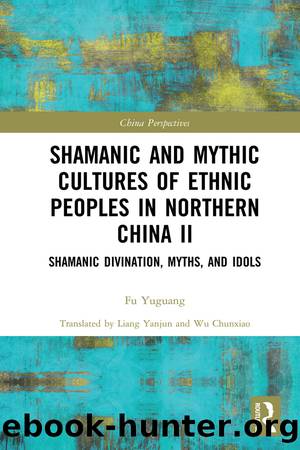Shamanic and Mythic Cultures of Ethnic Peoples in Northern China II by Fu Yuguang

Author:Fu Yuguang [Yuguang, Fu]
Language: eng
Format: epub
ISBN: 9780367654139
Barnesnoble:
Publisher: Taylor & Francis
Published: 2020-12-30T00:00:00+00:00
3.3 Other episodes of âWar in Heavenâ
In the various episodes of âWar in Heaven,â numerous ancient creation stories that bear the unique features of northern peoplesâ customs, habits, topographic characteristics, ethnic beliefs, and unique peculiarities have been passed down from generation to generation. As a whole, the work reflects the primordial religious influence of a close relation with ancient shamanism and constitutes to a great extent the major body of northern shamanic creation myths and the epitome of shamanic cosmology. At the same time, it fully preserves the track of thought of northern people in the day-to-day activities of their struggle for survival â charting of new paths, conquering nature, creating works of art, and establishing living settlements. The work reflects, moreover, the ideals and wishes of humanity in its childhood. On the whole, the myths displayed in âWar in Heavenâ are not just records of northern peoplesâ worldviews; they enrich the worldâs mythic treasure trove and culture.
In many sequences of the work, however, we can find obvious inconsistencies, gaps, and missing contents, due to the limitations of the conditions and modes of recording â simply seeing, hearing, and orally reporting what was heard. Some segments show later supplements and polishing by literary writers. The original Weceku Uleben shrine tales, moreover, were chanted in the Manchu language; in the Chinese retelling, the myths have, unfortunately, lost their original hue. Nonetheless, they have been passed on from ancient Jurchen shamans as they offered sacrifice and taught later generations. The myths give simple, naïve interpretations of ancient northern celestial phenomena, geography, natural forces, the birth of life, and concepts of survival that reflect primitive peopleâs psycho-mental complex. They have enjoyed lasting vitality and forever shine with their unique artistic rays of humanistic wisdom.
The dispersion of the myths of âWar in Heavenâ is not confined to one tribe or clan; they have been spread multi-ethnically. As was said earlier, while teaching in Siji Village on the Amur in the 1930s, Fu Xilu (my father) and Wu Jixian collected from villagers in the area the Weceku Uleben tales that they later called âWar in Heaven.â In addition to the foregoing version that they recorded from the White Mongolian, Fu received from the father of a man named Yan Tiewen (ééæ) a fragmented version that contains more Manni (Manye) tales than had previously been known and that enrich the narrative scope of the work. For example, the great goddess Jiazun Mayin, who is mentioned but not included in the White Mongolianâs version, appears in a tale of the sixth fiyelen of Yanâs version. It goes as follows:
Leluli (Yeluli) puffed up a black gale and belched out noxious waters. Abka Hehe sent two goddesses, Hūlūhun and Hūlūkun, to do some scouting, and they found that the earth was shaking, stones were being showered down from the heavens, and the land was sinking, causing spring waters to overflow. But it was too late to report back to Abka Hehe. Instantly, they began singing ucun (songs) at the top of their voice and danced hand in hand.
Download
This site does not store any files on its server. We only index and link to content provided by other sites. Please contact the content providers to delete copyright contents if any and email us, we'll remove relevant links or contents immediately.
Cecilia; Or, Memoirs of an Heiress — Volume 1 by Fanny Burney(32548)
Cecilia; Or, Memoirs of an Heiress — Volume 2 by Fanny Burney(31947)
Cecilia; Or, Memoirs of an Heiress — Volume 3 by Fanny Burney(31932)
The Great Music City by Andrea Baker(31917)
We're Going to Need More Wine by Gabrielle Union(19035)
All the Missing Girls by Megan Miranda(15962)
Pimp by Iceberg Slim(14489)
Bombshells: Glamour Girls of a Lifetime by Sullivan Steve(14058)
For the Love of Europe by Rick Steves(13933)
Talking to Strangers by Malcolm Gladwell(13350)
Norse Mythology by Gaiman Neil(13349)
Fifty Shades Freed by E L James(13233)
Mindhunter: Inside the FBI's Elite Serial Crime Unit by John E. Douglas & Mark Olshaker(9324)
Crazy Rich Asians by Kevin Kwan(9280)
The Lost Art of Listening by Michael P. Nichols(7494)
Enlightenment Now: The Case for Reason, Science, Humanism, and Progress by Steven Pinker(7306)
The Four Agreements by Don Miguel Ruiz(6745)
Bad Blood by John Carreyrou(6611)
Weapons of Math Destruction by Cathy O'Neil(6267)
